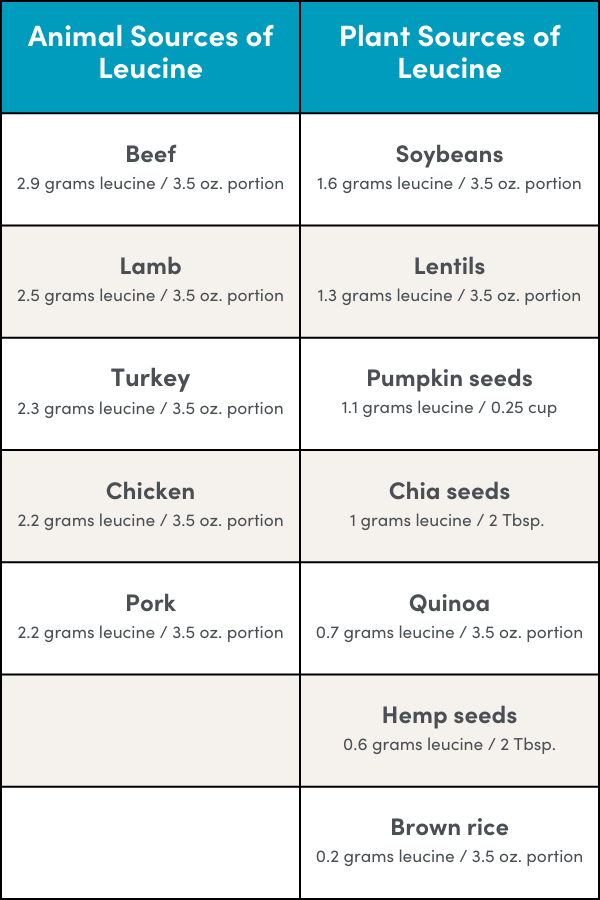Health/Wellness, Patient Blog | Sep 25 2023
Leucine’s role in muscle synthesis

For individuals who are interested in building muscle or older adults who are at risk of losing muscle as they age, the benefits and sources of leucine are important to know to achieve optimal muscle health.
What is leucine?
Leucine is one of twenty amino acids, which are considered the building blocks of protein. Of the amino acids, some are essential, meaning that the body cannot make them and they must be obtained from dietary sources. Leucine is one of nine essential amino acids. It is considered the most important for muscle growth and repair.
What does leucine do in the body?
Leucine has several roles in the body. Some of the most vital include:
- Playing an important role in protein synthesis and muscle metabolism.
- Being involved in wound healing and brain health.
- Contributing to energy production.
- Supporting immune function.
- Helping to regulate blood sugar levels.
Protein synthesis and muscle growth and development
The mechanism by which leucine initiates muscle protein synthesis is by activating the mammalian target of rapamycin complex 1 (mTORC1) pathway, which is responsible for muscle protein synthesis. Once this system is activated, leucine will start the production of new muscle protein and begin to produce and repair muscle tissue in the body. By consuming food rich in leucine, muscle health is optimized and muscle recovery occurs efficiently.
How much leucine is required?
Adults under the age of 60 years old should aim for 7.5 to 9 grams per day. For adults over the age of 60, 12 to 15 grams per day is recommended. For adults who are physically active, the high end of the range applies.
Foods high in leucine
Both animal and plant sources contain leucine. The chart below lists some popular food sources that are rich in leucine.

Leucine can also be found in nutritional supplements. Body builders and athletes are most likely to consume leucine supplements in the form of pills and powders as a way to boost muscle growth. However, nutritional supplements are generally not regulated by the Food and Drug Administration (FDA) and can be dangerous if taken in excess.
Conclusion
Obtaining adequate amounts of leucine through animal or plant-based foods will start a series of events that lead to increased muscle production and protein synthesis in the body. By consuming the recommended amount of leucine each day, your body can reap many benefits including blood sugar control, energy production, and improved brain health.
Take a look at your diet and consult with a registered dietitian to ensure you are taking in enough good sources of leucine for optimal muscle health.
If you have more questions about your diet, it’s always a great idea to speak with a registered dietitian. Registered dietitians are the only credentialed experts qualified to address your unique health questions. Click here to request a direct consultation with a dietitian today!
References:
10 Healthy High Leucine Foods. Available at https://www.healthline.com/nutrition/10-high-leucine-foods. Accessed on July 2, 2023.
Leucine Benefits, Sources, and How to Get Enough of It. Available at https://www.mindbodygreen.com/articles/leucine-benefits. Accessed on July 2, 2023.
What is Leucine? Available at https://www.verywellfit.com/how-to-use-leucine-for-weight-loss-3495727#:~:text=L%2Dleucine%20supplements%20are%20popular,grams%20of%20leucine%20per%20serving. Accessed on July 2, 2023.
Nutrient Regulation of mTORC1 at a Glance. Available at https://www.ncbi.nlm.nih.gov/pmc/articles/PMC6857595/. Accessed on July 2, 2023.
Who we are
Dietitians On Demand is the nationwide leader in providing dietitians with jobs they love. If flexibility, competitive pay, a full benefits package, free CPEUs each month and a team dedicated to dietitians sound good to you, apply to our positions today.




